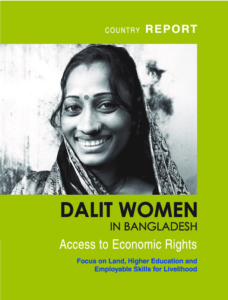
The study has found the practice of patriarchy in Dalit society at extreme level. The Dalit women hardly get opportunity to enjoy freedom of expression. Different schemes and quota system for Dalits have been recently introduced in Bangladesh. These measures brought some positive changes for wider Dalit community keeping Dalit women aside. Furthermore, there is no mention of special provision for Dalit women in the policies adopted by Bangladesh government.
Most of the respondents participated in the study held patriarchal mindset of the society responsible for their least progress in education, land ownership and engagement with the employable skills. The study also found high rate of early marriage in Dalit society which negatively affects their education, health and social dignity. However, introduction of quota system for Dalit students at different public universities has created opportunity for them getting access to higher education. Land rights of Dalit women isn’t recognized and practiced in Dalit society due to religious restriction. However, land distribution law and its practice among majority (in Muslim community) have encouraged some of the parents to distribute some of their lands to their daughters. This is a very positive indication that they study found 4% Dalit women inherited lands from their parents.
The provision of skills training for Dalit, Bedey and Horijon community that started in 2012-13 so far covered 5300 people from Dalit community. But, many people from Dalit community especially Dalit women didn’t get this opportunity. The statistics on Dalit community published by the department of social services didn’t include all the community. As a result, many Dalit women are still deprived of such government facilities. Hence, it is required that government skills training should reach to more Dalit women.
REPORT RECOMMENDATIONS:
- ACCESS TO HIGHER EDUCATION
- Government and civil society organizations, specially the organizations working in promoting and protecting the rights of Dalits, should conduct promotional activities on government policies and facilities for girl students It will help to reduce drop out of Dalit girls from school due to poverty.
- Awareness program on benefits of education, both from government and civil society, needs to apprehended in Dalit colonies and settlements
- Child Marriage Restrain Act 2016 needs to be reconsidered as it has kept the provision of “special circumstances” in the name of ensuring their “best interest”. According to this provision, marriage of a minor girl in specialcircumstances will not be considered as crime (Daily Prothom Alo, 24 November 201624)
- Alternative occupation for Dalits need to be ensured to reduce poverty
- The Dowry Prohibition Act, 1980 needs to implement properly
- More advocacy and campaign needs to conduct so that government ensures special measures for Dalits higher education
- ACCESS TO LAND RIGHTS
- Bangladesh government should enact ‘uniform family law’ instead of religion and custombased laws.
- Government should revise the Khas Land Distribution Policy and preserve quota for Dalit and Dalit women
- Income generating activities for Dalit women need to ensure. As many Dalit women will join the workforce, their traditional mindset will be changed.
- ACCESS TO EMPLOYABLE SKILLS FOR LIVELIHOOD
- Government and civil society organizations should take necessary measures to disseminate the services of Social Welfare Ministry for Dalits
- The training centers should be decentralized so that Dalit women from remote areas can also avail the facilities
- Technical and vocational institutes should introduce quota for Dalits
